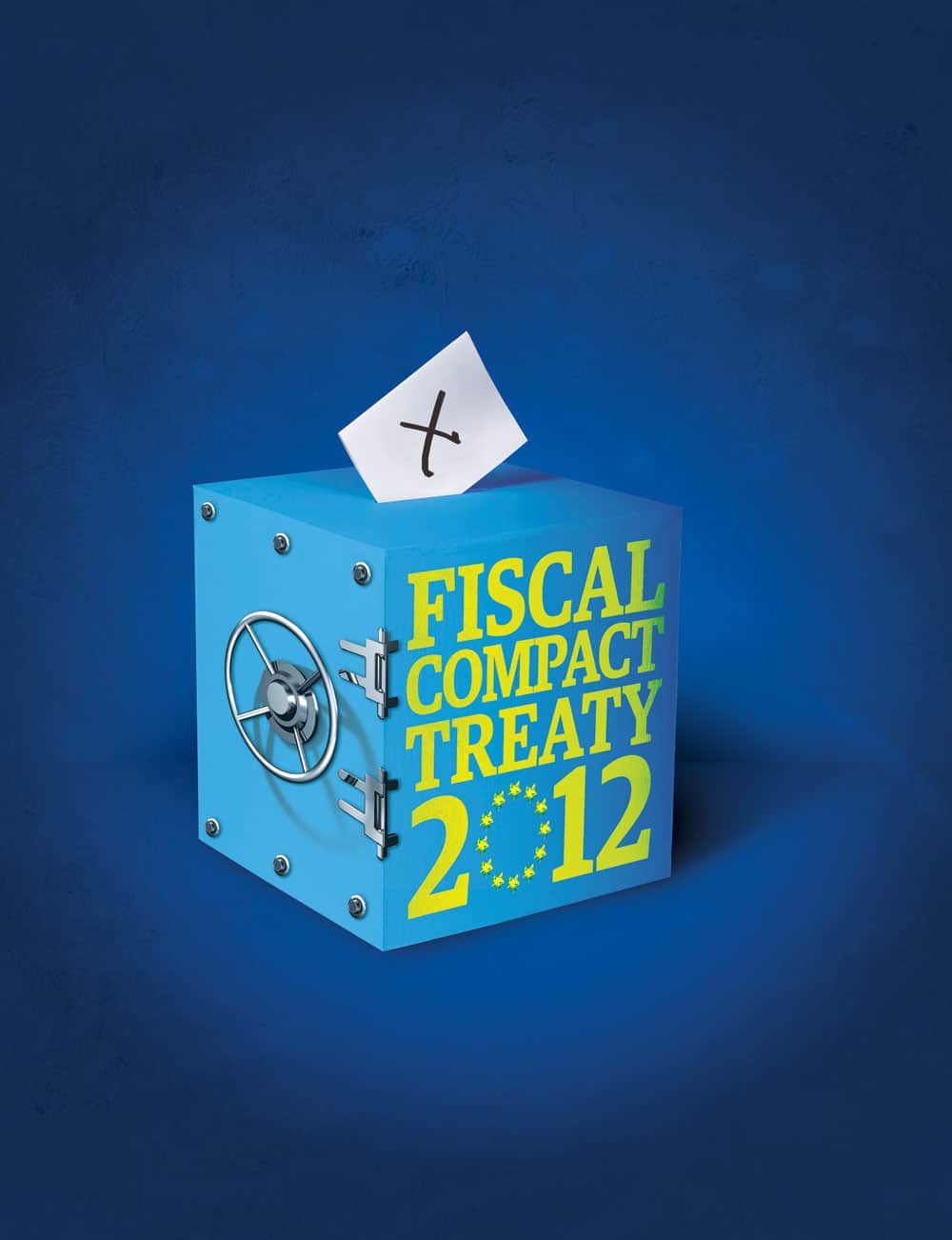John Walsh looks at the fiscal compact referendum and asks what it means for this country. Will a failure to ratify mean a euro exit?
The fiscal compact referendum has the potential to scupper an incipient recovery in this country and cast Ireland into the EU wilderness and economic uncertainty. Or at least, that is what the Government and the Yes campaigners will try and convince the electorate over the coming months. Sinn Féin is the only mainstream political party campaigning for a No vote, although the United Left Alliance of TDs spearheaded by Joe Higgins and Richard Boyd Barrett are also throwing their weight behind the No campaign. Early polls indicate a slim lead for the Yes campaign.
At the time of going to press, a referendum date had not been called, but it is believed that it will take place in late May or early June.
It could pan out that voters take a very narrow and literal interpretation of the question and opt for a Yes vote on the basis that a No vote could cut off access to a vital source of funding. But then again, on past form, Irish voters use the ballot box to register discontent. If that were to happen on this occasion, then Ireland’s relationship with the EU would materially change and put in doubt continued membership of the single currency.
Ireland’s EU/IMF bailout programme is scheduled to finish at the end of 2013. Theoretically, the Government will have introduced enough structural reforms and brought the fiscal deficit close enough to 3% of GDP to enable re-entry to the markets. But there are doubts about whether this will happen. “I don’t think the Irish situation is as good as it seems. GNP is a lot lower than GDP so the debt situation is a lot worse than it seems,” says Sony Kapoor, an international economics commentator and CEO of the think tank Re-define.
If market access is blocked or there is only limited access to the markets by the end of next year, then the Government could be forced to seek a second bailout, or at the very minimum a partial bailout. But countries that do not ratify the fiscal compact will not be allowed tap the euro zone’s permanent bailout fund, the European Stability Mechanism (ESM). That could put this country in a huge bind in the event of a No vote and in the event market confidence is not regained.
“On this occasion, if Ireland votes No, I don’t think the other member states will have much patience. They will move ahead and Ireland will be left to sink,” says Karel Lanoo, Brussels-based chief executive of the Centre for European Policy Studies. “Ireland will be faced with a choice of the guillotine and hanging rope.”
The future funding conundrum could sway the referendum in favour of a Yes vote unless the No camp can persuade an increasingly nervous electorate that the IMF or some other multilateral agency will step in and prevent a default. Moreover, the fiscal compact should be an easier sell than previous treaties, particularly Lisbon and Nice, which both failed at the first attempt. Neutrality, abortion and other emotive issues provided heated backdrops to the last two campaigns. They are unlikely to form part of the mix on this occasion.
In fact, much of what is contained in the fiscal compact was ratified by the Government in 2011. The reinforced ‘Six Pack’ Growth & Stability Pact (GSP) was adopted on December 13th last year. The main difference between the revised GSP and the fiscal compact is that the latter contains a clause prohibiting member states from running a structural fiscal deficit higher than 0.5% of GDP. Moreover, member states have to maintain debt-to-GDP at 60% or below.
The concept of making a structural deficit a cornerstone of EU economic policy has raised one or two eyebrows in the economics profession and beyond – not least because trying to pin down a robust definition of what constitutes a structural deficit will inevitably lead to much political horse-trading. Whether or not it will lead to member states being locked into pro-cyclical policies has also divided opinion.
“The drawback to the fiscal compact is that it will lead to pro-cyclical policies in times of crisis. There are exceptions that can deviate but the upshot is that will lead to pro-cyclical policies,” says Zsolt Darvas, an economist with Bruegel. “That is not a problem for countries with low debt levels like the Scandinavian countries, but it will create big problems for countries with high debt levels. There is no euro zone body that can help in the time of a downturn.”
Peter Vanden Houte, an economist with ING bank, says there are enough caveats in the proposed treaty to avoid pro-cyclical policies. “It is untrue that this will lead to pro-cyclical policies – that some countries will be forced to impose more austerity during a recession because their deficits will be too high. Using a structural deficit will avoid this problem because the deficit can be high during a recession – they will only look at the component not influenced by the cycle.” Vanden Houte points out that under the GSP, a deficit of 3% was non-negotiable, which was much more of a fiscal straitjacket.
Where is it going?
Of course the fundamental question is if the fiscal compact is already covered by the six pack, why are member states risking a further wave of political instability by putting this treaty up for ratification in 26 member states. British Prime Minister David Cameron took the unprecedented move of exercising a veto at the December 9th 2011 EU Council meeting, which means that the UK is exempt.
Ireland may be the only country putting the treaty to a referendum, but that does not mean its passage will be seamless. In, fact, it is likely to meet stiff opposition in the parliaments of Finland, Holland, France and the Czech Republic among other member states. If there is one thing that markets do not like, it is uncertainty.
Since the crisis erupted, the issue of European leadership has become a source of acute embarrassment on an international stage. At the G8 Summit in Cannes in November 2011, US president Barack Obama witheringly referred to the number of EU heads of state, commission officials and other technocrats in the European delegation.
The European Commission and Parliament have largely been sidelined since the financial crisis gained momentum in 2008. Instead a Franco-German axis has emerged as the clear powerbroker in the region. The European Central Bank has juggled with the twin challenges of sticking to its mandate of price stability at the same time as preventing the European sovereign debt edifice from collapsing. And at all time asserting its political independence, which has won the institution few friends over the past three years.
Political cover
One theory is that the fiscal compact provides political cover for German Chancellor Angela Merkel and the German parliament to introduce other reforms needed to shore up the European economy.
To this end, the fiscal compact would act as an important foundation block. For much of the first decade of the life of the euro, there was a huge divergence in competitiveness between northern European countries and what have been pejoratively described as the ‘Club Med’ countries of southern Europe.
Inevitably this has prompted a political backlash in northern European countries. Populist parties have emerged in Finland and Holland – two of the regions AAA-rated member states. Moreover, Merkel is open to charges that she has been more eager to appease an increasingly restive domestic tabloid press than coming up with an enduring solution to this crisis.
The fiscal compact would make fiscal discipline legally binding among all member states. The view is that if member states are hemmed in by budgetary constraints, then the more solvent countries will become more amenable to more federalist policies on the funding side. Eurobonds are seen as the most effective way of solving funding pressure for countries such as Ireland, Spain, Italy, Portugal and Greece. Moreover, much of the current crisis stems from member states bailing out their banks. Again, one of the policies put forward is a banking union, which means that if a bank collapses then a federal fund could be used to cover the losses of that institution.
At least that is one theory. Lannoo believes that the region is moving backwards. “The bailout of the banks remains the responsibility of national governments. This is extremely worrying.”
Bruegel’s Darvas says that a Eurobond or a banking union is unlikely unless Italy runs into a deep fiscal crisis over the next couple of years. “That would be a game changer”. The size of Italy’s economy means that it is too big to save, which would presage a move to much closer integration. “But that would come at the loss of significant fiscal sovereignty,” says Darvas.
“I think this a stepping stone towards something more meaningful,” says Kapoor. “The problem is that it could take a while. For example, I could see a serious discussion starting about Eurobonds over the next few years, but we will not see Eurobonds within five years, at least.” But if there is no game-changer such as Italy and complacency replaces panic as the EU’s mood music, then it could mean that the political will to introduce any further reforms dissipates.
Spain and Portugal are both locked into austerity programmes in order to get their deficits under control. If there are no accompanying measures to boost growth, then unemployment, which is already at chronic levels in both countries, could surge and stoke destabilising levels of civil unrest. If that were to happen, then the euro could unravel as member states are forced to exit.
“My fear is that after the fiscal compact and the three-year LTRO [the ECB’s 1% long-term refinancing operation], there is the risk that no other serious measures will come and that will mean a prolonged recession in the south. How that is resolved will be key to keeping the euro zone together,” says Darvas.
Troika talks
Yeses, Nos and promissories
The Irish Government is locked in negotiations with the troika on restructuring Ireland’s bank debt. There are two separate strands to these talks. There is a €3.06bn promissory note payment due on March 31st. At the time of going to press, the Government was edging closer to a deal, whereby this payment will be swapped for a long-dated Irish Government bond. If successful, then the short-term relief would be more political than economic and it would certainly boost the Government’s prospects of securing a Yes vote in the fiscal compact referendum.
The second strand to the troika talks relates to the overall €31bn in promissory notes possibly combined with the loss-making tracker mortgage books of the pillar banks. Obviously, if the Irish Government could alleviate the country’s debt burden over the near to medium term, then it would greatly enhance the possibility of market re-entry when the current bail out programme ends in 2013.
It is believed that the IMF and European Commission are receptive to the Government’s requests; the ECB and the AAA member states much less so.
Bruegel’s Zsolt Darvas believes that the Irish Government will be successful and there will be an overall restructuring of the bank debt, but there will be no reduction in the net present value of that debt. Rather, it will be rolled up into an EFSF [European Financial Stability Facility] bond, with a long-dated maturity, which will give the Irish sovereign much greater breathing space.
“I do not believe that there will be a write down of Irish debt”, says Darvas. “A restructuring deal through the EFSF would be feasible.”






